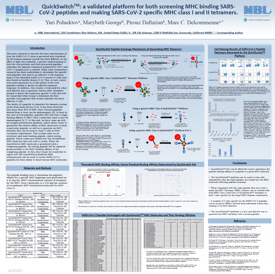QuickSwitchTM: a validated platform for both screening MHC binding SARS-CoV-2 peptides and making SARS-CoV-2 specific MHC class I and II tetramers
INTRO: The basic research to uncover the exact mechanisms of how the SARS-CoV-2 virus is perceived and countered by the human immune system has been difficult. In the effort to fight this outbreak, a greater understanding of how the viral proteins and their processed peptides stimulate the immune responses mediated by CD8+ and CD4+ T lymphocytes is needed. While some tremendous research has been undertaken to determine the specific viral peptides that lead to an effective T cell response, many of the identified SARS-CoV-2-reactive T-cells were also found in healthy donors [1,2]. This, in turn, raises even more questions as to the nature of the viral peptides needed to mount an effective immune response. In addition, this creates a vital need for a fast and effective way to generate various MHC tetramers needed to detect the numerous specific T cells that will be researched while trying to determine the best possible viral peptides that would stimulate the most effective T cells.
The ability of a peptide to stimulate the immune system stems from many factors [3,4]. It has been observed, that more than 80% of MHC class I-bound peptides derived from a virus can be immunogenic [5]. At least in the case of viral peptides, peptides that that have a high binding affinity to MHC Class I molecules tend to also be immunogenic [6,7]. To this end, we have come up with an antigen presentation platform, which allows users to quantitate the relative ability of MHC molecules to bind a particular peptide, as well as to generate an MHC tetramer that can be used to stain T cells in Flow Cytometry experiments. This system relies on an irrelevant and weak binding peptide, called exiting peptide, which comes pre-loaded into the recombinant MHC molecule that you wish to study. When the QuickSwitch MHC molecule is presented with a competing peptide, the exiting peptide will be replaced proportionally to the MHC binding affinity of the competing peptide. In this short study we would like to report how the QuickSwitch platform (MBL International) can be used to screen SARS-CoV-2 peptides for their ability to bind various MHC molecules.
